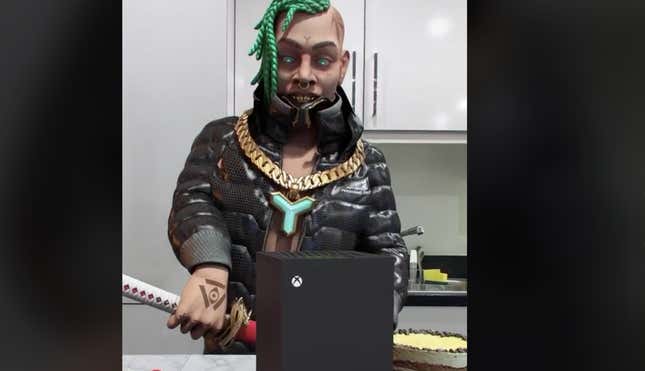
One week ago, headlines were abuzz with the news that Capitol Music Group had signed a digital rapper called FN Meka whose lyrics were generated by artificial intelligence. Now, after much backlash and criticism from around the internet, Capitol Music Group is undoing that decision, instead axing the rapper with a profuse apology for offending people in its decision to platform something many have criticized as an example of “digital blackface.”
The initial signing was announced with the release of a track called “Florida Water,” which featured hip hop artist Gunna along with, curiously, 17-year-old Fortnite pro Clix. Clix is signed with RG Esports and has reportedly won $162,000 at the Fortnite World Cup. When the single came out, though, there was a lot of confusion about Clix’s actual involvement with the project. After all, if you listen to the song, it never seems to actually feature Clix’s voice. All the promotional material for the songs, however, didn’t just cite Clix—his name appeared before that of Gunna and FN Meka themselves, the performers.
Clix’s manager tells Kotaku that Clix “selected” the track, meaning he acquired the rights and released the copyright after Gunna had already rapped on the song. What’s interesting here, though, is that Clix’s manager claims that Clix never wanted FN Meka involved in the first place.
“Capitol Records said if he wants to get the Gunna song released he has to let them put their artist Fn Meka on it,” he said in an email. “It was never what he wanted and he voiced that opinion but was told by the label that this was the only path forward.”
After featuring the song prominently across his social media through pins, Clix appears to have purged it from immediate visibility.
All of this comes on the heels of Capitol Records distancing itself from FN Meka, the New York Times reports. In a statement provided to the times, which was also sent to Kotaku post-publication, the company said the following:
We offer our deepest apologies to the Black community for our insensitivity in signing this project without asking enough questions about equity and the creative process behind it. We thank those who have reached out to us with constructive feedback in the past couple of days — your input was invaluable as we came to the decision to end our association with the project.
The backlash has to do with concerns over racism and, as the NYT puts it, “digital blackface.” The rapper, who has 10.3 million followers on TikTok and was explicitly marketed as an act “at the intersection of music, technology and gaming culture” by its creators, appears to be Black-coded despite not actually being, y’know, real. But there’s a larger question about how much artistic control Black artists actually have over the overall FN Meka project. The New York Times article states that while FN Meka is indeed voiced by a Black man, things like “lyrical content, chords, melody, tempo, sounds” were partially derived by artificial intelligence. At the same time, allegedly, only one white man is involved with FN Meka’s act.
Some of the criticism is hand-waved away by the music professionals cited in the article when they imply that modern musicians are often basically commerce-driven puppets who do and say as they are told. So, the thinking seems to imply, perhaps it should be enough that there’s a Black performer involved, even if they aren’t the true engine behind the AI rapper. But the fact that FN Meka’s output was aimed at gamers, and very explicitly uses the aesthetics of gaming, certainly complicates things—especially when it comes to Fortnite.
The battle royale has come under fire in the past for not appropriately looping in or compensating Black artists who created the dances that became incorporated into the game as purchasable emotes and helped the shooter explode in popularity. Fortnite has since made efforts to rectify this, but ultimately it is just another in a long line of pop culture phenomena that wouldn’t exist as it does without the invisible contributions of Black creators.
Moreover, FN Meka’s attempt to bridge the gap and make digital rap cool very much hinged on gaming’s willingness to absorb Black culture. When FN Meka brags about his riches, he’s isn’t just showing off cars and jets that look like they could come out of a video game. The vehicles are all decked with bespoke gaming chairs, rather than the supple leather that you might expect from these boasts. Sound effects FN Meka features in his videos come out of games like Metal Gear Solid. FN Meka will take the time to cut into an Xbox Series X that is revealed to be a cake. FN Meka, whose green glow is reminiscent of Razor products, drops onto the scene to promote his new song riding a Fortnite battle bus. FN Meka will fight his enemies with a Halo knockoff energy sword.
And FN Meka has AI which commands him to say the n-word, along with videos where he is shown to be beaten by a police officer in prison. These aren’t unrelated things. They were calculated, and they worked. FN Meka’s videos have racked up millions of views.
“Some of the early content, now if you take it out of context, it obviously looks worse or different than it was intended,” Anthony Martini, a founder at Factory New, the company behind FN Meka, told the New York Times.